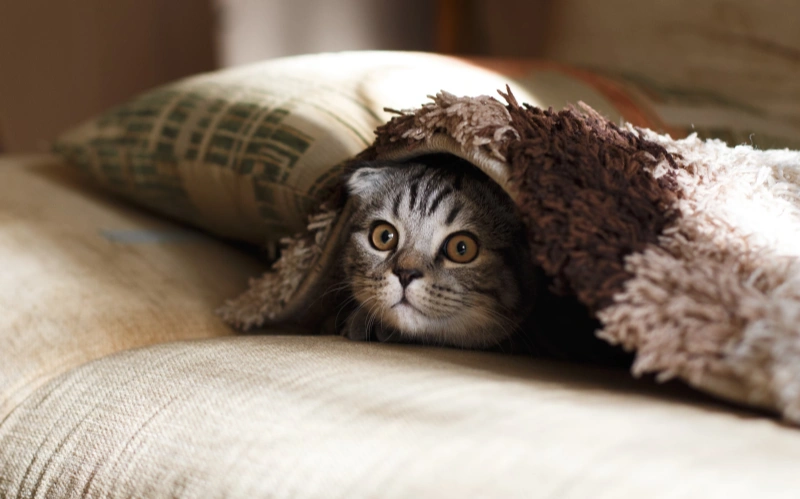Symptoms, Detection Methods, and Treatment Strategies of Feline Coronavirus (FCoV)
Feline Coronavirus (FCoV) is a common virus in felines that has received a lot of attention in recent years. In this article, we will discuss the symptoms, detection methods and treatment strategies of feline coronavirus.

Symptoms of feline coronavirus
Feline coronavirus is mainly transmitted through faeces, and cats may show different symptoms after infection. The most common symptoms include:
Gastrointestinal symptoms: mild to moderate diarrhoea and vomiting are the most common symptoms of feline coronavirus infection. These symptoms may last for days to weeks and result in dehydration, loss of appetite and weight loss in cats.
Malaise: Cats infected with feline coronavirus may show signs of malaise, lethargy or loss of energy.
Respiratory symptoms: Although less common, feline coronavirus may also cause respiratory symptoms such as coughing and runny nose.
It is important to note that many cats may be completely asymptomatic after infection with coronavirus, which makes the spread of the virus more insidious. Therefore, even if a cat does not show obvious symptoms, the possibility of it being infected with coronavirus cannot be ruled out.
Veterinary Rapid Test Kit for Feline Coronavirus(fcov ag/ab rapid test)
Diagnostic Test Kits of feline coronavirus is crucial to confirm the diagnosis of infection. The following are some common rapid test kit for pet:
PCR: PCR (Polymerase Chain Reaction) is a highly sensitive and specific method that can directly detect viral nucleic acids. By extracting the viral RNA from the cat's faeces, saliva and other samples, and using PCR to amplify the viral RNA fragments, thus determining whether the cat is infected with coronavirus, PCR has the advantages of high accuracy and easy operation, and is one of the most commonly used testing methods at present.
Serological testing: Serological testing is used to determine whether a cat has been infected with coronavirus by detecting the presence of coronavirus antibodies in the cat's body. Commonly used serological methods include enzyme-linked immunosorbent assay (ELISA) and immunofluorescence assay (IFA). These pet medical supplies are simple and rapid, but may be affected by factors such as vaccination, resulting in inaccurate results.
Virus isolation and culture
Virus isolation and culture is a method of direct virus detection. By collecting samples of cat faeces, saliva, etc., the virus is cultured under specific cell culture conditions, and the growth of the virus is then observed. This method can directly observe the presence and growth of the virus, but the operation is cumbersome, time-consuming and requires high laboratory conditions.
In order to obtain more accurate diagnostic results, it is usually recommended to combine multiple veterinary test methods for comprehensive judgement.
Treatment strategies for feline coronavirus
Currently, there are no specific drugs for the treatment of feline coronavirus. Treatment is mainly supportive, focusing on relieving the cat's symptoms and maintaining its vital signs. The following are some common treatment strategies:
Correcting dehydration: As diarrhoea and vomiting may cause dehydration in cats, adequate hydration and electrolyte replacement is required to correct dehydration.
Antibacterial treatment: If the cat's diarrhoea and vomiting symptoms persist, a bacterial infection may be triggered. In this case, appropriate antibacterial medication can be given.
Immune support: Give the cat some immune enhancers such as interferon and vitamins to strengthen its immune system and help fight the viral infection.
Isolation and care: isolate the cat infected with feline coronavirus to avoid spreading the virus to other cats. At the same time, provide a quiet and comfortable environment to keep the cat warm and dry to promote its recovery.
In conclusion, feline coronavirus is a common feline virus that poses a threat to the health of cats. Understanding the symptoms, detection methods and treatment strategies for feline coronavirus is essential to protecting your cat's health. If your cat exhibits any of these symptoms or is suspected to be infected with feline coronavirus, consult your veterinarian and undergo appropriate pet diagnostic tests and treatment.
Antigenne, holding the banner of enjoying living together with animals and protecting the health both of animals and humans, is dedicated to building a harmonious society for humans and animals. Insisting on the values of innovation, honesty and integrity, sticking to the principle of “quality is the cornerstone of future existence, through innovative products and dimensional services, Antigenne is looking forward to cooperating with you and expecting to create a bright future with a win-win result.
With six years of industry experience, Antigenne has built a solid foundation of knowledge and expertise in developing efficiently and accurate diagnostic reagents. The creation of SaberVetnot only reinforces the company's commitment to quality and innovation but also serves as a testament to its unwavering dedication to improving animal health and welfare. Together, we can make a difference. Contact Antigenne now and let's unlock the future of animal health.


